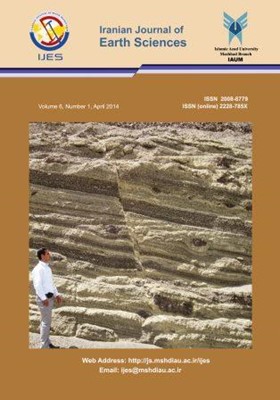Paleoenvironmental Reconstruction of Miocene Surma Succession in the Well Rashidpur # 04 of Bengal Basin Using Log Facies Interpretation
محورهای موضوعی : MineralogyMd. Ahosan Habib 1 , Abu Reza Md. Towfiqul Islam 2
1 - Geological Survey of Bangladesh, 100 pioneer road, Dhaka, 1000, Bangladesh
2 - Department of Disaster Management, Begum Rokeya University, Rangpur, 5400, Bangladesh
کلید واژه: Paleoenvironments, Log facies, Well Rashidpur-04, Bengal Basin and Deltaic system,
چکیده مقاله :
Detailed log facies studies of Miocene succession in the well Rashidpur-04, Rashidpur structure, Surma Basin were carried out by integrating wireline log and limited core sample data in order to reconstruct the paleoenvironments of deposition. Based on the analysis of the log motifs, grain size, sand/shale ratio and major change in gamma ray log motifs, two major depositional sequences were identified in the well Rashidpur-04 which consists of 17 para-sequences sets and 22 para-sequences. Serrated bell, funnel, cylindrical, egg/bow and linear log facies were recognized in the study well. Lithology indicates that the whole well interval consist of alteration of sandstone, siltstone, shale and prodelta facies. The Rashidpur sequence-2 inferred to be deposited in tidal flat to shallow marine conditions in prograding and retrograding delta front condition whereas the Rashidpur sequence-1 assumed to be deposited under tidal channel, distributary channel, tidal flat, mudflat, marine inter-distributary bay to shallow and deep marine conditions. The Rashidpur sequence-2 was deposited in comparatively deep water condition while the Rashidpur sequence-1 was deposited in relatively shallow water condition. The present study can be concluded that Miocene succession was coarsening upward in nature and might have deposited under prograding deltaic system.
Detailed log facies studies of Miocene succession in the well Rashidpur-04, Rashidpur structure, Surma Basin were carried out by integrating wireline log and limited core sample data in order to reconstruct the paleoenvironments of deposition. Based on the analysis of the log motifs, grain size, sand/shale ratio and major change in gamma ray log motifs, two major depositional sequences were identified in the well Rashidpur-04 which consists of 17 para-sequences sets and 22 para-sequences. Serrated bell, funnel, cylindrical, egg/bow and linear log facies were recognized in the study well. Lithology indicates that the whole well interval consist of alteration of sandstone, siltstone, shale and prodelta facies. The Rashidpur sequence-2 inferred to be deposited in tidal flat to shallow marine conditions in prograding and retrograding delta front condition whereas the Rashidpur sequence-1 assumed to be deposited under tidal channel, distributary channel, tidal flat, mudflat, marine inter-distributary bay to shallow and deep marine conditions. The Rashidpur sequence-2 was deposited in comparatively deep water condition while the Rashidpur sequence-1 was deposited in relatively shallow water condition. The present study can be concluded that Miocene succession was coarsening upward in nature and might have deposited under prograding deltaic system.


